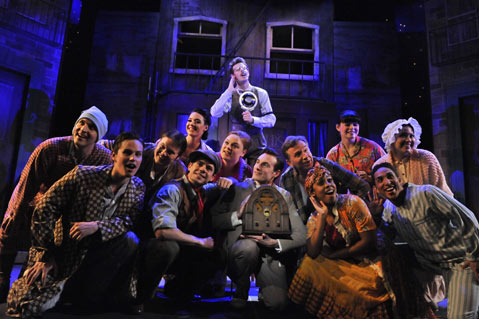Hello! My Baby at Rubicon Theatre
Tin Pan Alley Music in a New Show Through April 15

In the early 20th century, when the first modern popular songs were being written on Tin Pan Alley, the streets of lower Manhattan were filled with young men who were paid to sing and to sell sheet music. The world of these “song pluggers” is the setting for Hello! My Baby, the new musical now running at the Rubicon Theatre, and despite the fact that the term “song plugger” has fallen out of use, the concept certainly lives on. For someone to buy a song, someone has to “sell” it, either by singing it so well that the music seems irresistible or by finding some other, often more direct way to overcome the buyer’s resistance. Hello! My Baby manages to do both — it revives the music of that long-ago era effectively, and it delivers enough drama, character, and wit to succeed on its own terms as a new show. In Brian McDonald’s tightly choreographed, bright and snappy production, neglected songwriting genius Nelly Gold (Evie Hutton) gets both the guy (Ciaran McCarthy’s Mickey McKee) and the glory (with her compositions becoming hits), thus remaking the age-old convention of the trouser comedy into something that even 21st-century women can embrace. Faced with the choice of either sewing in a sweatshop or seeking employment as a song plugger by disguising herself as a boy, Nelly puts on the pants she’s been making and becomes the hottest new “boy soprano” on the block. It’s a kind of radical rethink of the character Louise from the first half of Gypsy, and it benefits enormously from the excitement created by a performer like Hutton, who brings great razzle-dazzle to such sequences as the big “plug-off” with Mickey in Act One.
As Mickey, McCarthy also shines, although his job is often to play foil to one of the more eccentric figures in the cast. Case in point: his scenes with the hilarious Harley Jay as Johnny Giovanni, the perpetually rhyming neighborhood goodfella who shakes down the Gold sisters for protection money. Many of the laughs in Hello! My Baby come from outstanding performances in the secondary roles, and one of the show’s main strengths is the way that it creates so many opportunities for the actors to shine. As Bert and Ethel Coots, the couple who runs one of Tin Pan Alley’s song shops, George Wendt and Kristine Zbornik create several kinds of comedy, including some borderline “PG” moments courtesy of Irving Berlin’s 1919 song “You’d Be Surprised.” Will Sevedge excels in his role as the Yale-educated romantic nincompoop Junior Tierney, and his wooing of Jordan Kai Burnett’s Frances Gold provides the show with a solid second romance. The climax of their initial courtship, which occurs at a restricted debutante ball at the posh Beekman Club, gives the show an important secondary theme, as well, which is how songwriting accompanied assimilation for artists like Irving Berlin, who famously married a prominent Irish Catholic.
The melodramatic developments of the second act include the threat of a wrecking ball about to smash the Golds’ tenement house on the lower East Side, but the real news is that the songs keep coming, fast and thick. “There’ll Be Some Changes Made,” “You Made Me Love You,” and “Ain’t We Got Fun?” provide an unstoppable momentum for the swiftly moving plot as it hurtles toward the finale, and when the audience is invited to sing along with the title number, it’s clear that this Baby is here to stay.



